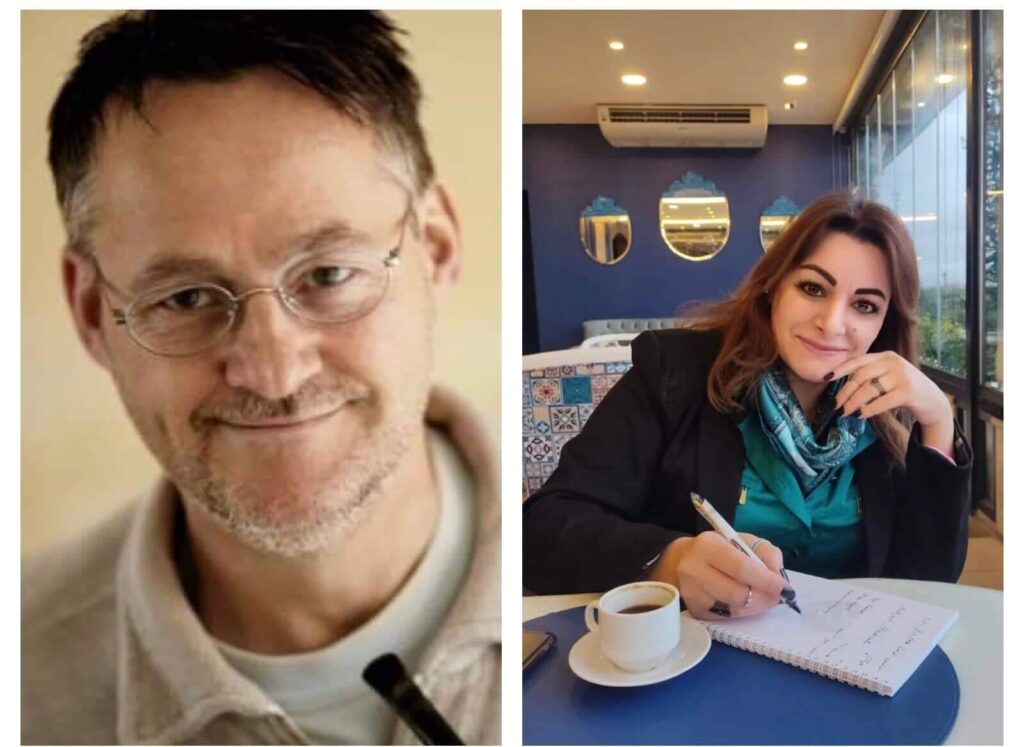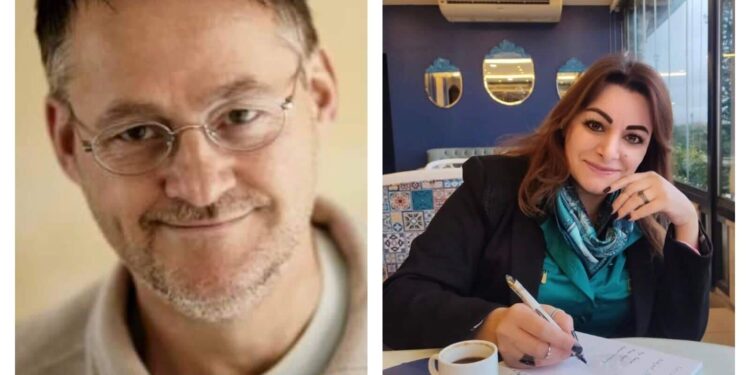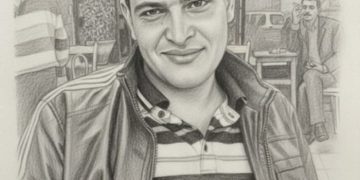حوار الشاعر الدنماركي :نيلس هاو لمجلة أزهار الحرف
حاورته من لبنان الصحفية :نجوى الغزال
Interview with Niels Hav conducted by Nasser Ramadan Abed Al _ Hamid & Najwa Ghazal
1-Why do you like Arabic language and what are the literary aesthetics that you found in it and you didn’t find in your own mother language?
Niels Hav: To me, the sound of the Arabic language is a music that encompasses all the melodies of the soul, from deep melancholy, longing, tenderness, presence and twinkling happiness. The cradle of culture stood in the Middle East, and the Arabic language contains connotations with roots in the oldest myths and ancient wisdom. We have to listen.
I do not understand Arabic, unfortunately, I was born in a wrong country. In Egypt and throughout the Arab diaspora newborn babies lie in the cradle, listening to happy women laughing and talking together in Arabic. They grow up with that sound ringing in their ears, and carry the melody with them like a dream of happiness. Throughout life, they long for the sound of happy women talking and laughing.
Human languages are like birdsong; every bird sings with its beak. Before we understand a language and know the meaning of the words, we listen to the music of the words, the melody. The Arabic language has connotations of Old Persian and ancient times, and the aesthetics of classical Arabic poetry are influenced by the Qur’an. Even the melody of modern Arabic poetry draws inspiration from the service in the mosque.
2-What is the reason that stands behind your love to Naguib Mahfouz and Al_Maari?
NH: I am not an expert in Arabic literature, I speak like a blind man talking about the colors. Our world is built of words and stories. With his tales Naguib Mahfouz has built 20th Century Egypt. Naguib Mahfouz has taught the Egyptians what it means to be Egyptian. When he received the Nobel Prize in 1988, the Swedish Academy said in the motivation: “Naguib Mahfouz has formed an Arabian narrative art that applies to all mankind.” This is the highest praise you can give any author.
I think it was my friend, the novelist Shaker Alanbari, who made me aware of Abu al-Ala al-Maari, the classical Arabic-language poet, blind, and well-known for composition of outstanding poetry. He condemned the injustice and hypocrisy of rulers and religious scholars a thousand years ago. Unfortunately his words are still relevant; the rulers and the religious scholars have not improved much, they seem to be sluggish and bad students. They should study Abu al-Ala al-Maari with humility and respect.
3-What is the role of poetry and other kinds of arts in the social life?
NH: When Joe Biden was inaugurated as president in USA, the poet Amanda Gorman was reading at the ceremony. The poet may take on a similar role in different cultures. But in everyday life, and most of the time, the poet is an outsider. A lonely bandit in the desert. We are soloists, we celebrate the same virtues as the Bedouins: perseverance and generosity. Some poets among our colleagues know about suffering and hunger. Power and money seem to rule the world. But on a deeper level this is an illusion. There are higher values than gold, wealth and spaceships. To remember this and retaining this knowledge is one of poetry’s tasks.
We all carry some precious words in our hearts. Maybe a song, maybe some lines written by a poet. These valuables keep us alive.
4-Is the one who enjoys humanity in its high level can write the poetry or the opposite is true?
NH: Thank you, this is a brilliant question. Identity is a central theme throughout these years. A showdown with cultural arrogance. The culture on all continents contains waste from the past. We are overloaded with identity, you are Russian, Egyptian, Indian or Canadian Inuit before you are a human. That’s the problem. We were born naked, but we are immediately clothed and dressed up with a culture and a religion. We have to let go of parts of our cultural dress and meet each other as human beings. Then we are on the same level.
Good poems grow in humble places. There are no rules, we know that. Genuine poems are anarchists. That is why some rulers are afraid of poetry, the poets have no respect for political power. That’s why some weak dictators can not sleep at night, they are scared. The poets may be banned from reciting poetry, but the wind whispers the truth.
5-What is the lesson that you want from your readers to get from your book ”Moments of Happiness”, and are a few moments of happiness enough to give the spirit of giving and love again?
NH: I hope the reader will take the poems she or he needs and use them in his or her own life. I have written the poems, now they no longer belong to me, how the poems are read is out of my control. I love that.
Having said this, it is of course clear that it is my hope that the reader captures the basic ethical and humanistic mood of my poems.
I am proud that some poems from “Moments of Happiness” have been translated into Arabic by the poet Salim Abdali. Being translated by him is a special joy because Salim is my friend, but also because Salim is Danish and understands the many nuances of the Danish language, at the same time as he masters the Arabic language to perfection, because he himself is a poet and writes in both languages, he also translates Adonis into Danish.
6-Are literary works translated into a language other than the mother tongue affect people as the original does?
NH: We never know. Poems and songs travel. When translated, the poems have their own lives. It is beautiful. The pandemic and the corona are closing many borders this winter, we are sitting in isolation separately around the globe. But our poems travel. Like dreams. Let’s write great poetry and dream big dreams.
7-What is the motive behind your participation in “Flowers of literature” book that issues by Arab poets forum headed by the poet Nasser Ramad Abed AL Hameed?
NH: The “Flowers of literature” book is an interesting project and a new platform to me. I always long to return to Cairo and maybe some day attend the book fair there. Egypt is an ancient nation with a young population, among the young there is a great book hunger for more life, happiness and insight into the mysteries of the universe. It is the miracle that the wild energy and inspired ingenuity are reborn in each new generation. Our planet, which we share, revolves through the universe. There are climate problems, political problems and daily disasters, hunger and poverty. But the vital zest for life of young people allows us to hope that more beautiful days await us.
Ancient Egyptian pharaohs left the pyramids to their descendants. What do we leave behind to next generation? Plastic waste and climate damage? Let us accomplish something great together, let us share the resources of the planet fairly and live in harmony with different cultures and religions. It’s too early to give up. Maybe we should build 1 great pyramid to celebrate our golden age of possibilities? We should leave something beautiful for our descendants.
1-لماذا تحب اللغة العربية وما هي الجماليات الأدبية التي وجدتها فيها ولم تجدها في لغتك الأم؟
نيلز هاف: بالنسبة لي ، فإن صوت اللغة العربية هو موسيقى تشمل جميع ألحان الروح ، من حزن عميق وشوق وحنان وحضور وسعادة متلألئة. وقفت مهد الثقافة في الشرق الأوسط ، وتحتوي اللغة العربية على دلالات تعود جذورها إلى أقدم الأساطير والحكمة القديمة. علينا الاستماع.
أنا لا أفهم العربية ، للأسف ولدت في بلد خاطئ. في مصر وفي جميع أنحاء الشتات العربي ، يرقد الأطفال حديثو الولادة في المهد ، يستمعون إلى النساء السعوديات يضحكن ويتحدثن معًا باللغة العربية. يكبرون مع رنين هذا الصوت في آذانهم ، ويحملون اللحن معهم مثل حلم السعادة.طوال الحياة ، يتوقون إلى صوت المرأة السعيدة تتحدث وتضحك.
اللغات البشرية مثل أصوات العصافير. كل طائر يغني بمنقاره. قبل أن نفهم لغة ونعرف معنى الكلمات ، نستمع إلى موسيقى الكلمات ، اللحن. اللغة العربية لها دلالات على الفارسية القديمة والعصور القديمة ، وجماليات الشعر العربي الكلاسيكي متأثرة بالقرآن. حتى لحن الشعر العربي الحديث يستلهم من الخدمة في المسجد.
2-ما سبب حبك لنجيب محفوظ والمعري؟
نيلز هاڤ: لست خبيرًا في الأدب العربي ، أتحدث كرجل أعمى يتحدث عن الألوان. عالمنا مبني من الكلمات والقصص. نجيب محفوظ بحكاياته بنى مصر القرن العشرين. نجيب محفوظ علم المصريين معنى أن تكون مصريًا. عندما حصل على جائزة نوبل عام 1988 ، قالت الأكاديمية السويدية في دافع: “نجيب محفوظ شكل فن سرد عربي ينطبق على البشرية جمعاء”. هذا هو أعلى مدح يمكن أن تقدمه لأي مؤلف.
أعتقد أن صديقي الروائي شاكر الأنباري هو الذي أطلعني على أبو العلاء المعري الشاعر العربي الكلاسيكي الكفيف والمعروف بتأليف الشعر المتميز. وأدان ظلم ونفاق الحكام وعلماء الدين منذ ألف عام. لسوء الحظ ، لا تزال كلماته ذات صلة ؛ الحكام وعلماء الدين لم يتحسنوا كثيرا ، ويبدو أنهم طلاب بطيئون وسيئون. وعليهم أن يدرسوا أبي العلاء المعري بتواضع واحترام.
3-ما هو دور الشعر وأنواع الفنون الأخرى في الحياة الاجتماعية؟
نيلز هاڤ: عندما تم تنصيب جو بايدن كرئيس للولايات المتحدة الأمريكية ، كانت الشاعرة أماندا جورمان تقرأ في الحفل. قد يقوم الشاعر بدور مماثل في ثقافات مختلفة. لكن في الحياة اليومية ، وفي معظم الأوقات ، يكون الشاعر دخيلًا. لصوص وحيد في الصحراء. نحن عازفون منفردون ، نحتفل بنفس فضائل البدو: المثابرة والكرم. يعرف بعض الشعراء من زملائنا المعاناة والجوع. يبدو أن القوة والمال يحكمان العالم. لكن على مستوى أعمق ، هذا مجرد وهم. هناك قيم أعلى من الذهب والثروة وسفن الفضاء. إن تذكر هذا والاحتفاظ بهذه المعرفة من مهام الشعر نحن جميعنا نحمل كلمات قيمة في قلوبنا، ممكن ان تكون اغنية او سطور مكتوبة من شاعر فكل هذه القيم تبقينا على قيد الحياة.
4-هل من ينعم بالإنسانية في مستواها الرفيع يستطيع أن يكتب الشعر أم العكس هو الصحيح؟
شكرا لك ، هذا سؤال رائع. الهوية هي موضوع مركزي طوال هذه السنوات. مواجهة مع الغطرسة الثقافية. تحتوي الثقافة في جميع القارات على نفايات من الماضي. نحن مثقلون بالهوية ، فأنت روسي أو مصري أو هندي أو إنويت كندي قبل أن تصبح إنسانًا. تلك هي المشكلة. لقد ولدنا عراة ، لكننا على الفور نرتدي ملابسنا وثقافتنا وديننا. علينا أن نتخلى عن أجزاء من لباسنا الثقافي ونلتقي ببعضنا البعض كبشر. ثم نحن على نفس المستوى.
القصائد الجيدة تنمو في الأماكن المتواضعة. لا توجد قواعد ، نحن نعلم ذلك. القصائد الحقيقية أناركيون. لهذا يخاف بعض الحكام من الشعر ، والشعراء لا يحترمون السلطة السياسية. هذا هو السبب في أن بعض الطغاة الضعفاء لا يستطيعون النوم في الليل ، فهم خائفون. قد يُمنع الشعراء من تلاوة الشعر ، ولكن الريح تهمس بالحق.
5-ما هو الدرس الذي تريد من قرائك أن يستخلصوه من كتابك “لحظات السعادة” ، وهل تكفي لحظات قليلة من السعادة لإعطاء روح العطاء والحب مرة أخرى؟
نيلز هاڤ: آمل أن يأخذ القارئ القصائد التي يحتاجها ويستخدمها في حياته. لقد كتبت القصائد ، والآن لم تعد تخصني ، فكيف تُقرأ القصائد خارج عن إرادتي. أحب ذلك.
بعد قولي هذا ، من الواضح بالطبع أنني آمل أن يلتقط القارئ المزاج الأخلاقي والإنساني الأساسي لقصائدي.
أنا فخور بترجمة بعض أشعار “لحظات السعادة” إلى العربية للشاعر سليم العبدلي. إن الترجمة من قبله هي متعة خاصة لأن سالم هو صديقي ، ولكن أيضًا لأن سالم دنماركي ويفهم الفروق الدقيقة في اللغة الدنماركية ، وفي نفس الوقت يتقن اللغة العربية إلى حد الكمال ، لأنه هو نفسه شاعر و يكتب باللغتين ، كما أنه يترجم أدونيس إلى الدنماركية.
6-هل الأعمال الأدبية المترجمة إلى لغة أخرى غير اللغة الأم تؤثر على الناس كما تفعل اللغة الأصلية؟
نيلز هاڤ: لا نعرف أبدًا. أشعار وأغاني السفر. عند ترجمتها ، فإن القصائد لها حياتها الخاصة. انه جميل. الوباء والكورونا يغلقان العديد من الحدود هذا الشتاء ، نحن نجلس في عزلة منفصلة حول العالم. لكن قصائدنا تسافر. مثل الاحلام. دعونا نكتب شعرا عظيما ونحلم بأحلام كبيرة.
7-ما هو الدافع وراء مشاركتك في كتاب “من أزاهير الأدب”الذي يصدر عن ملتقى الشعراء العرب برئاسة الشاعر :ناصر رمضان عبد الحميد؟
نيلز هاڤ: كتاب “من أزاهير الأدب” مشروع مثير للاهتمام ومنصة جديدة بالنسبة لي. دائمًا ما أتوق للعودة إلى القاهرة وربما أحضر يومًا ما معرض الكتاب هناك. مصر دولة قديمة بها عدد من الشباب ، ومن بين الشباب هناك تعطش كبير للكتب لمزيد من الحياة والسعادة والتبصر في ألغاز الكون. إنها معجزة أن الطاقة البرية والبراعة الملهمة تولد من جديد في كل جيل جديد. كوكبنا ، الذي نشاركه ، يدور من خلال الكون. هناك مشاكل مناخية ومشاكل سياسية وكوارث يومية وجوع وفقر. لكن الحماس الحيوي لحياة الشباب يسمح لنا أن نأمل في أن تنتظرنا أيام أجمل.
ترك الفراعنة المصريون القدماء الأهرامات لأحفادهم. ماذا نترك ورائنا للجيل القادم؟ النفايات البلاستيكية والأضرار المناخية؟ دعونا نحقق شيئًا عظيمًا معًا ، دعونا نتشارك موارد الكوكب بشكل عادل ونعيش في وئام مع الثقافات والأديان المختلفة. من السابق لأوانه الاستسلام. ربما يجب أن نبني هرمًا عظيمًا واحدًا للاحتفال بعصرنا الذهبي من الاحتمالات يجب أن نترك شيئًا جميلًا لأحفادنا.





















